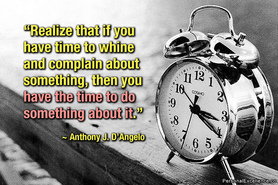 Do it!
Do it! You have to slog at some other place, day in and day out in order to pay the bills, and you have to do the creative stuff on the side. It's tough. It sucks. I know we all fantasize about endless days stretching before us, with nothing other than making stuff as our goals. But the truth is, it takes time and effort to get there, and it's never easy (then everyone would do it, right?). So, I've come up with a few strategies that have helped me to be more productive (or, as a dear friend recently said to me, "Fucking prolific."). Maybe they will help you, too.
1. Make your creative time regular time. Don't sacrifice it for anything.
We all wish the muse would strike when we are sitting in front of our screens, but ah, she is a fickle one. You have to go to her. So do it. How? Create a schedule and stick to it. Set aside time as often as you think is realistically possible for you to work on your creative projects, and then use that time. Don't let anything stop you from keeping that appointment. If it helps to think of it as a new job that you have to show up for (and your boss, YOU, hates it when you're late!), then do that. When your best bud calls you up and wants to grab dinner, tell them you'll be available after. Tell your family, or roommates, or whomever might be in your space, to leave you alone. Or better yet, remove yourself from their presence. If you can carve out a little 'office' in your house, do that. If you want to go to the coffee shop, bar, library, or street corner to help you focus, do that. Just make sure you keep your appointment and show up for work. Creative work.
2. Make a list. Prioritize.
About a year ago, I discovered an app called Todoist. It has improved my productivity immensely. Why? Because I can keep a running list of things that I need to get done. I can set it to send me reminders every day, or at certain times, or whatever works for me. I can set it to repeat tasks every day, every week, or whatever. I can have multiple projects in the list, so I don't forget to buy dog food while I'm remembering to work on my most recent opus. Or vice versa. Best of all, Todoist keeps track of what you accomplished, and gives you karma points for getting things done. No, you don't get anything from karma points, other than the warm fuzzy feeling of knowing that you got some stuff done. It also shows how productive you are from day to day, which is great motivation for those of us who like getting feedback.
Once you have the list, decide what is most important. Do those things first. FIRST. Don't do the easiest things first. That will kill your motivation since you'll be tired later. Also, break your todo list down into small goals. Writing down 'write the novel' is admirable, but not terribly helpful, since you can't do it in one day. Just set a small task that you can accomplish before the day is over. Something like 'write three pages', or, for those of us who really need baby steps, 'write one paragraph'. Whatever you need in order to get it done. The more you accomplish, the easier it is to keep going, since you feel like you're making progress.
3. Make time your friend. Sprint, then rest.
We all want to say, yes, I'm going to work on this project ALL DAY today. But really, we can't. Our brains don't want to do that. The truth is, we can only focus on things for short periods of time, so don't fight that. Another great app is called Clockwork Tomato, and it times you for 25 minutes, then gives you a 5 minute break. You can also customize it if you'd like, but I like the short bursts of focusing all your attention. It seems so much more manageable, since I'll start the timer, then start writing. Somewhere around 15 minutes in, my brain starts to think, 'geez, this is kind of boring. How much more of this is left?'. So I look at the clock, and there's only 10 minutes left. My brain says, 'Yay! Almost done!', and I churn more work out in that 10 minutes, then get to rest for 5. Then start all over. It has immensely helped my productivity during those times I've set aside to do creative work.
4. Keep track.
As I've mentioned, it helps to feel like you've made progress. You'll feel a lot less like Sisyphus with that damned rock every day. So give yourself little victories. Yay, you worked for two whole hours today! Good work! I like to keep a journal to track that progress, which is really just a chart. I chart what I'm working on, how many words I wrote, and then make any notes that might have affected me that day, such as being on vacation, feeling blocked or distracted, or trying to write in a different location. Then, over time I can see what I've been doing, and see how many projects I've actually started AND finished, and how long it took. This also helps me when I'm scheduling my creative work, since I can be more realistic about how much time I can really spend on a project every day or week.
So that's it. Just four things. Now go create. And, if you want, come tell me about it. I'd love to know what people are up to!

 RSS Feed
RSS Feed
